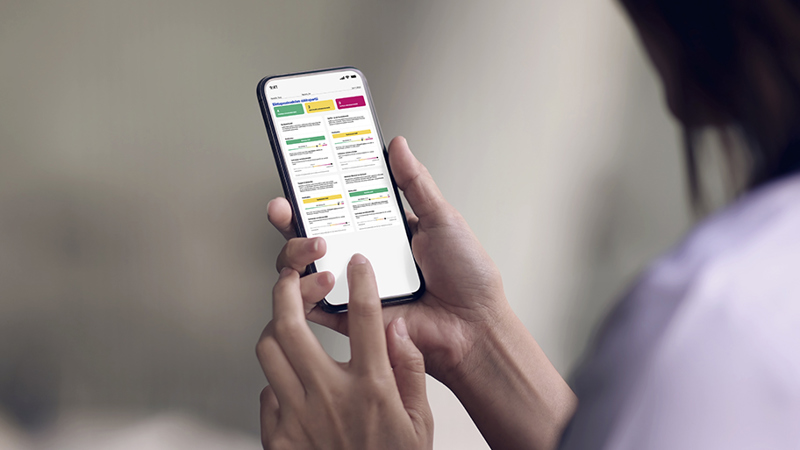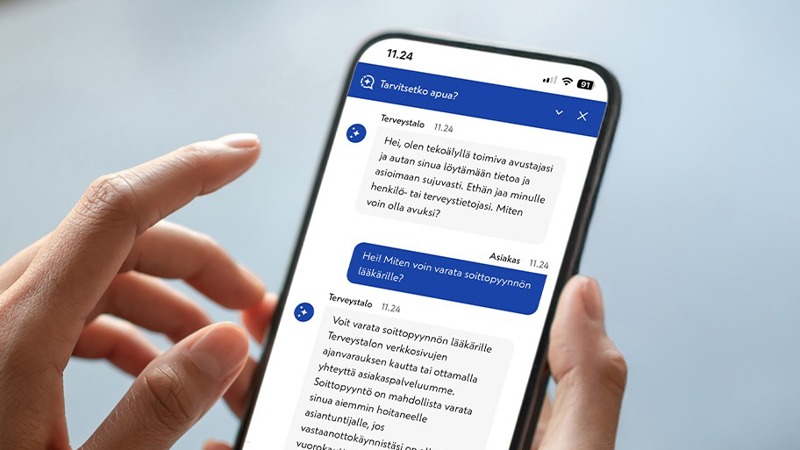A drop won't kill you, but it can tell you a lot!
To understand the big picture, you sometimes have to dive deeper than the surface. Because we can't always see the subtle signals that are key to maintaining work capacity, we need modern tools to help us find out. Nightingale's blood analysis technology, offered exclusively to Terveystalo's occupational health clients as part of a health check-up, opens a window into a person's wellbeing and potential risks to their ability to work. Antti Kangas, CTO and founder of our partner Nightingale Health, explains how a drop of blood can be used to squeeze a path to healthier and more productive work.

What can you find out from blood?
A blood sample can be used to look at metabolism, as many of the building blocks, end products and nutrients involved in different metabolic processes circulate in the bloodstream. In turn, analysing blood values can tell us where our health is heading. Based on a comprehensive blood test and analysis of the values measured, it is possible to identify the risk of developing many lifestyle diseases that threaten health and working capacity.
Metabolism and lifestyle are strongly linked and lifestyle changes, such as changing to a healthier diet, are also reflected positively in blood values and reduced risk of disease. Lifestyle choices are also linked to mental well-being. Healthy lifestyles contribute to mental well-being, while challenges to well-being make it more difficult to maintain healthy lifestyles. Lifestyle and lifestyle diseases are also strongly linked to musculoskeletal disorders. The key is to be able to identify risks early and create a virtuous circle where healthy lifestyles and overall well-being feed into each other.
How does Nightingale's blood analysis differ from a normal blood test
Traditional laboratory methods usually only analyse one or at most a few values at a time from a single blood sample. The technology developed by Nightingale can therefore be compared to magnetic resonance imaging, where a blood sample is scanned and the concentrations of many metabolic markers are measured in a single measurement. The method has been used internationally for more than 10 years in medical research and its reliability has been validated for clinical use.
Nightingale's blood analysis allows healthcare professionals to identify lifestyle-related disease risks more comprehensively and effectively than before. As a result of the blood analysis, the practitioner and the client will see a report assessing the individual risk of eight common lifestyle diseases: myocardial infarction, cardiovascular disease, type 2 diabetes, liver fibrosis and cirrhosis, alcoholic liver disease, chronic kidney disease and, in smokers, pulmonary hypertension and lung cancer.
However, the result of a blood test is not a verdict but rather an observation, as lifestyle diseases are preventable through lifestyle changes.
How quickly do values change?
Lifestyle changes can have a significant impact on the risk of disease. But changes do not happen overnight in a one-off blip. Change should be sustainable in everyday life so that it can become part of a new healthy life. This is why the recommended interval for follow-up is about 2-3 months. This is also the time it takes for blood counts to improve. The work environment and the support and incentives of the work community can also play an important role in making the change; after all, people spend a large part of their waking hours at work.
Why do we need blood analysis, isn't the Health Questionnaire enough?
There is an old saying that you can't see the wood for the trees. If a decision is based on only one thing, it is easy to make an unnecessarily one-sided interpretation. Health professionals understand this and therefore try to gather as much information as possible to make the best possible treatment decision. The health check takes a broad view of health and ability to work, allowing the use of multiple sources of information. Nightingale's blood analysis brings a new tool to the health check, based on the latest research, which will help to identify lifestyle-related disease risks more comprehensively and effectively than before. By its non-biased nature, blood analysis is a neutral way to assess health status, providing both the professional and the client with information that is not visible from the top down.
For example, BMI, which is widely used as a risk factor for health status, has excellent statistical predictive value, but it alone is not enough to make a reliable estimate. For example, a high BMI may also be the result of the body composition of people who do a lot of sport, while a person with a low BMI may be at high risk of developing a lifestyle disease.
All lifestyle diseases selected for the Health Check Risk Report have a strong metabolic component, making blood analysis an excellent way to assess their risk. The professional will also take into account other risk factors in his/her assessment, which may be identified through additional tests at the clinic (e.g. blood pressure) or through a Health Questionnaire and discussion.
How can blood analysis help predict health problems?
Unlike genetic tests, which tell us about our genetic predisposition to disease caused by hereditary factors, blood analysis can reveal things that everyone can influence through their lifestyle. Even if you are at increased risk, you may not yet have symptoms. In lifestyle diseases, there is rarely a single moment when a disease becomes symptomatic, because lifestyle diseases develop gradually. The risk report will tell you, without mincing words, where your health is heading if you keep going in the same direction. The risk report is a natural way to start a discussion to find the root causes of the risk of disease and to think together about possible changes. The aim is to ensure that the risks identified do not materialise.
Read more occupational health articles

What is metabolic age and why should you care about it?
A new laboratory study by Terveystalo reveals how your body is aging. Metabolic age makes biological aging visible.

Smooth assistance for your needs – our AI assistant is now at your service
You can now find Terveystalo’s AI assistant on our website — a quick and easy way to get answers based on the information available on our site. For now, the assistant is available only on the Finnish‑language section of our website, but you can chat with it in English.

How technology helps relieve mental stress: "When the load is high, the threshold must be low."
Mental health disorders have overtaken musculoskeletal disorders, which had long been the leading cause of sick leave. Work is changing, and the range of sick leave caused by mental health issues has also changed. We must be able to offer new solutions to this challenge.

Extensive data set of 200,000 samples: Nightingale study reveals link between illness risks and sick leave
Data from the Finnish Nightingale study, which is used in Terveystalo's occupational health services, reveals a clear link between lifestyle-related health risks and sick leave. The exceptionally extensive data set of over 200,000 customers shows that people with a low risk of illness had significantly fewer absences, while those in high-risk groups had more absences. The results highlight the importance of preventive healthcare in ensuring work ability and the competitiveness of companies.

Strong identification speeds up your service experience when calling us
Soon you can identify yourself easily and securely before your call is answered. Read below to see how the identification process works.

Terveystalo's digital services have been awarded the internationally recognized ISO27001 information security certification.
Terveystalo's information security practices, processes, and risk management are in line with international best practices.